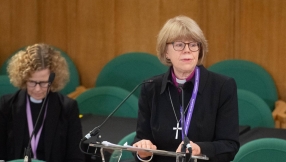Religious persecution in China intensified in 2020, with thousands of Christians affected by church closures and other human rights abuses, according to a new report from ChinaAid.
ChinaAid's research on persecution in China last year documented nine church demolitions carried out by Chinese Communist Party authorities, affecting more than 5,000 members and attendees.
Overall, CCP authorities persecuted 100% of house churches, the study found, with police summoning and questioning every church's main leader.
Under the direction of Chinese President Xi Jinping, CCP officials also worked to more fully control "religion," ordering Christians in both official, state-run churches as well as in house churches to fly the Chinese flag, and sing patriotic songs in services. Authorities also directed ministers and priests to "Sinicize" sermons, or alter them to conform to CCP ideology.
According to the report released this week, CCP authorities also invaded Christians' homes, raided family gatherings, and interfered with parenting decisions. In numerous instances, authorities sued Christians for homeschooling their children or sending them to church-run schools.
"ChinaAid's research for 2020 confirms that China's persecution of Christians and of those professing any belief again exceeded incidents reported for the previous year," the report says.
"As suppressed facts have emerged from dark, secret places, the fallout from the CCP's persecution, like results from the unchecked Covid-19 pandemic, present a potent, putrid threat to challenge the outside world to pay attention."
The group said it publishes its annual report to "not only increase awareness of religious persecution in China, but to promote religious freedom for all."
ChinaAid's findings come on the heels of the 2021 annual report from The U.S. Commission on International Religious Freedom that identified China as an egregious violator of human rights, specifically toward Christians and Uyghur Muslims.
The report notes that CCP authorities continued their unprecedented use of advanced surveillance technologies to monitor and track religious minorities last year.
"Although the CCP has long repressed religious freedom, in recent years it has become increasingly hostile toward religion," the report says.
The Commission recommended that the U.S. redesignate China as a "country of particular concern," or CPC, for engaging in systematic, ongoing, and egregious violations of religious freedom.
Previous reports reveal that schools in China have been teaching children that Christianity is an "evil cult," while children are being taught to oppose religion, encouraged to question the beliefs of family members and report those closest to them to authorities.
USCIRF Commissioner Gary Bauer commented: "Communist China doesn't only deny its citizens basic human rights, including the right to seek and worship God. It is also asserting itself as a new authoritarian model for developing nations around the world. It is actively engaged in undermining international human rights standards. It utilizes its growing military power to intimidate and threaten its neighbors."
Open Doors ranks China at No. 17 on its World Watch List of 50 countries where Christians are most persecuted.
Boyd-MacMillan, director of Strategic Research at Christian charity Open Doors, recently told Express UK that the CCP is becoming increasingly concerned about the Christian population's growth and is cracking down on religion as a result.
"We think the evidence as to why the Chinese Church is so targeted, is that the leaders are scared of the size of the Church and the growth of the Church," Boyd-MacMillan said.
"And if it grows at the rate that it has done since 1980, and that's about between 7 [percent] and 8 percent a year, then you're looking at a group of people that will be 300 million strong, nearly by 2030. And, you know, the Chinese leadership, they really do long term planning, I mean, their economic plan goes to 2049, so this bothers them. Because I think if the Church continues to grow like that, then they'll have to share power."
Courtesy of The Christian Post













